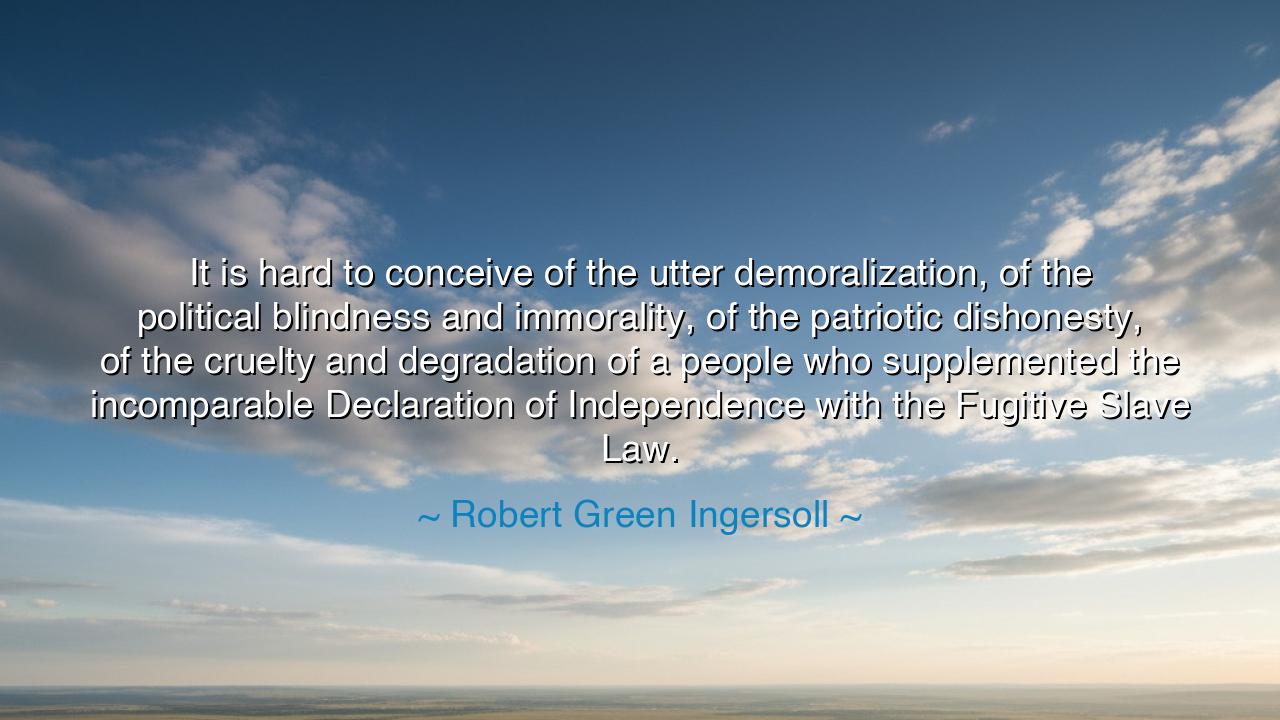
It is hard to conceive of the utter demoralization, of the
It is hard to conceive of the utter demoralization, of the political blindness and immorality, of the patriotic dishonesty, of the cruelty and degradation of a people who supplemented the incomparable Declaration of Independence with the Fugitive Slave Law.






The words of Robert Green Ingersoll, fierce orator and champion of human liberty, burn like fire against hypocrisy and moral blindness. When he declared, “It is hard to conceive of the utter demoralization, of the political blindness and immorality, of the patriotic dishonesty, of the cruelty and degradation of a people who supplemented the incomparable Declaration of Independence with the Fugitive Slave Law,” he was not merely speaking as a critic of his time—he was acting as the conscience of a nation. His words are a thunderclap of moral clarity, exposing the terrible contradiction at the heart of early American history: that a nation which proclaimed liberty for all could, in the same breath, enforce bondage for millions.
To understand the origin of this quote, we must look to the dark years before the American Civil War, when the United States was still divided between freedom and slavery. The Fugitive Slave Law of 1850, passed as part of the Compromise of 1850, demanded that runaway slaves be returned to their masters even if they had escaped into free states. Worse still, it required ordinary citizens to aid in this cruel pursuit, punishing any who dared to help the enslaved find liberty. It turned every town, every household, into a potential hunting ground for human beings. To Ingersoll, who was born into a nation that prided itself on the Declaration of Independence—that sacred document declaring that “all men are created equal”—such a law was a moral abomination. It was as though a people had written poetry to the heavens while wallowing in the mud of their own injustice.
Ingersoll’s words are not simply a condemnation—they are a mirror held up to humanity’s enduring hypocrisy. He saw in the Fugitive Slave Law a symbol of how easily noble ideals can be corrupted when convenience and cowardice rule the heart. He called it “patriotic dishonesty”, for it cloaked itself in the language of law and order, of union and loyalty, while violating the very spirit of freedom that gave America birth. He called it “political blindness”, for it showed a nation unwilling to see that slavery was not a regional issue but a moral disease infecting the whole body of the republic. His voice trembled not with hatred, but with sorrow—for a people who could recite the words of liberty even as they chained others had lost sight of what it truly meant to be free.
To see the tragedy he described, one need only remember the story of Anthony Burns, an escaped slave captured in Boston in 1854 under the Fugitive Slave Law. Citizens who had believed their city a haven for freedom watched in horror as federal troops marched Burns through the streets in chains, returning him to bondage. Church bells tolled in mourning as thousands wept and protested. For many, that moment shattered the illusion that America could remain half free and half enslaved. It was a wound that would not heal until war and blood washed it clean. Ingersoll, reflecting on such events years later, saw in them the proof that moral compromise leads only to moral ruin.
In the tone of the ancients, we may say: no nation can serve both justice and injustice and remain whole. The Declaration of Independence was the covenant of the American soul—a promise written in divine ink. To betray it was to desecrate something sacred. The Fugitive Slave Law, then, was not merely a law—it was a national sin, an act that stained the conscience of generations. Ingersoll’s anguish was not only for the enslaved, but for the enslavers themselves—for he saw that those who enforce tyranny lose their humanity alongside their victims. The chain that binds one man’s body also binds another’s spirit.
Ingersoll’s voice, though born in the nineteenth century, still speaks to the moral struggles of every age. For every generation faces its own Fugitive Slave Law—its own temptation to trade principle for comfort, justice for peace, truth for power. The forms may change, but the essence remains: the conflict between what is right and what is convenient. His words call upon us to measure not our patriotism by how loudly we praise our nation, but by how faithfully we live its highest ideals. To claim freedom while denying it to others is to live in degradation, no matter how grand our flags or how eloquent our laws.
The lesson of Ingersoll’s words is eternal: liberty without justice is hypocrisy, and patriotism without morality is corruption. It is not enough to inherit the words of freedom—we must understand and live them. A people’s greatness is not measured by their prosperity, but by their compassion; not by their laws, but by their conscience. Ingersoll teaches that when a nation’s deeds betray its principles, its citizens must become its prophets, reminding it of what it once vowed to be.
And so, the practical path is this: remember that every declaration of freedom carries a responsibility. Speak truth even when silence is safer. Defend the oppressed even when the law forbids it. Let not your pride in your nation blind you to its flaws, but let your love for it drive you to heal them. For as Robert Green Ingersoll declared, the contradiction between freedom and slavery, between justice and hypocrisy, is not merely a stain upon the past—it is a warning to the future. Only when a people’s deeds match their declarations will they be truly free, and only then will the immortal words of their founding—“all men are created equal”—shine with the purity they were meant to bear.






AAdministratorAdministrator
Welcome, honored guests. Please leave a comment, we will respond soon